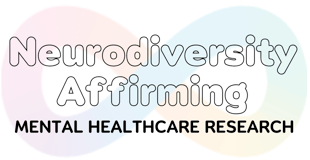
About the Project


By combining technological innovation with genuine community partnership, we are paving the way for a more inclusive, accessible mental healthcare system for all.
Our research project is focused on improving mental healthcare experiences for neurodivergent adults.
By centring neurodivergent voices, we seek to understand the nuanced experiences, needs, and preferences of autistic and ADHD individuals in mental healthcare settings to identify key aspects of care that matter most to this community.
Our goal is to develop evidence-based recommendations for neurodiversity-affirming care, potentially including a tailored patient-reported experience measure.
This work strives to enhance the accessibility, effectiveness, and inclusivity of mental health services, ultimately reducing disparities and improving outcomes for neurodivergent adults.
On this page, you will find:
Content Warning
This website may contain information that may be distressing to some readers.
It includes information about the experiences of Neurodivergent people (Autistic and ADHD individuals) and the challenges and barriers we face due to non-inclusive environments (physical, attitudinal and social).
If you need support, the following free services are available to help you.
Autism Connect
A free, national autism helpline, providing independent and expert information about autism over the phone, email and webchat. It supports Autistic people, their families and carers and support networks, health professionals, researchers, teachers, employers and the broader community.
Available from 8 am to 7 pm, Monday to Friday.
Telephone 1300 308 699.
Website: Autism Connect.
Beyond Blue Support Service
A free telephone and online service is available to everyone for brief counselling.
24 hours a day, 7 days a week.
Telephone 1300 224 636
Chat online 24 hours a day, 7 days a week.
Email for free, short-term counselling, advice and referral services.
Website: Beyond Blue Support Service.
13 YARN
A free and confidential one-on-one crisis support service available for Aboriginal and Torres Strait Islander peoples.
Available 24 hours a day, 7 days a week.
Support from First Nations crisis counsellors is available at 13YARN (13 92 76) or
by visiting: 13 YARN.
Qlife
An anonymous and free LGBTIQ+ peer support and referral service for people in Australia wanting to talk about sexuality, gender, bodies, feelings or relationships.
Call: 1800 184 527
Website: https://www.qlife.org.au.
Lifeline Crisis Support
A confidential service providing support when you are feeling overwhelmed, having difficulty coping or thinking about suicide.
24 hours a day, 7 days a week.
Speak to a crisis support worker by telephone on 13 11 14.
Chat online 24 hours a day, 7 days a week.
Website: Lifeline Crisis Support.
headspace
A free online and telephone support and counselling to young people between ages 12-25 every day from 9am–1am AEDT.
Call 1800 650 890.
Chat online through webchat to speak to a clinician.
Send an email for a response within 2 days.
More information, including how to create a headspace account, can be accessed at: Connect with a mental health clinician 1-on-1 | headspace.
Why is this Research Important?
Autistic and ADHD individuals report significantly greater barriers to accessing mental health support compared to their neurotypical counterparts.
These barriers contribute to high unmet mental healthcare needs, ranging from 20-40% of the total mental healthcare needs.
Consequently, individuals with these neurotypes are three times more likely to experience mental health issues compared to their neurotypical peers.
The increased susceptibility to death by suicide underscores the significance of these unmet needs.
These confronting facts highlight the urgency of understanding and addressing the barriers to mental health support experienced by neurodivergent individuals, especially among young adults.


What is Neurodivergence?
Neurodivergence refers to variations in brain functioning that diverge from what is considered neurotypical or typical brain processing. This includes conditions like autism, ADHD, dyslexia, and others. We believe neurodivergent individuals possess unique strengths, talents, and ways of perceiving the world that should be valued and supported equitably.
Our research focuses on Autism and ADHD, both of which present with distinguishably different socio-cognitive processing styles, which pose advantages and disadvantages within current societal norms.
Given the commonality in experiences among these distinct neurotypes, the purview of this research is to include both identities, collectively denoted as "neurodivergence" (in combination with identity-first language reflecting community preference).
We note that neurodivergent individuals' self-identity preferences can vary. Therefore, throughout this project, participants will be asked how they choose to identify, and their choice will be recognised and respected, with self-determination at the centre of all discussion.


Rationale for Inclusion of both ADHD and Autistic Adults
Autism and ADHD are distinct neurotypes, and also they share several commonalities.
These neurotypes represent a significant portion of the neurodivergent population, comprising 8.3% to 14.4% of the estimated 15-20% of the total population who are neurodivergent.
Focusing on both ADHD and Autism can help inform and develop best practices applicable to broader neurodivergent populations.
This approach aims to create a more inclusive and effective mental health system, serving the neurodivergent community while acknowledging individual needs.


Neurodiversity-Affirmng Approach
A neurodiversity-affirming approach recognises and respects neurological differences as natural variations in human cognition and does not view them as disorders or deficits.
This perspective embraces the idea that identities such as autistic, ADHD, and dyslexic are part of the rich tapestry of human neurodiversity.
In research and practice, this approach is crucial because it shifts the focus from trying to "fix" or "cure" neurodivergent individuals to understanding the unique strengths, challenges, and needs of individuals to create inclusive environments.
By adopting a neurodiversity-affirming stance, researchers and practitioners can develop more inclusive, effective, and ethical methods to create inclusive environments.
This approach fosters a fairer society by promoting acceptance, accommodating diverse cognitive styles, and challenging stigma.
Ultimately, a neurodiversity-affirming approach in research and practice leads to better outcomes for neurodivergent individuals, as it respects our autonomy, values our perspectives, and aims to create environments where neurodivergent individuals can thrive on our own terms.


Get Involved
Get involved in shaping this important research.
Stay Informed






Stay informed by registering for our quarterly email newsletter to receive the latest updates and insights from our research.
Expression of Interest to Participate in Research
Neurodivergent adults interested in sharing their perspectives to help shape more inclusive mental health support are invited to register their expression of interest to receive emails about potential opportunities to co-design and participate in our research studies.
Application for Community Advisor Board Member
We welcome neurodivergent individuals to express interest in joining our advisory panel, where your lived experiences and insights will directly guide the direction and implementation of this vital research.
